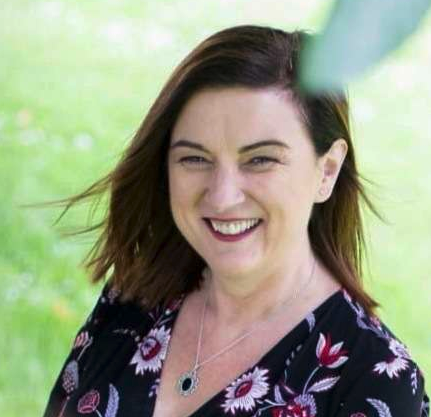
Sonja Tiernan is the Eamon Cleary Chair of Irish Studies and co-director of the Centre for Irish and Scottish Studies at the University of Otago, New Zealand.
Writing in late October from Otago, she inaugurates a new series for the Institute's website: Three Questions.
Professor Tiernan has visited the Keough-Naughton Institute on several occasions—first as the National Endowment for the Humanities-Keough Fellow in the 2010-2011 academic year, when she completed researching and writing Eva Gore-Booth: An Image of Such Politics (Manchester University Press, 2012); and most recently in February 2020, when she spent a week on campus after winning a Keough-Naughton Library Research Award.
___________________________________________________
I moved to New Zealand in June 2019 with my wife, Charlotte, so that I could take up position as Chair of Irish Studies at the University of Otago. During this most uncertain time, we find ourselves in an enviable situation of living in a country that is currently containing the spread of Covid-19. New Zealand initiated a state of emergency and went into lock-down during the early stages of the pandemic here.
Only weeks before the lock-down, I was at Notre Dame. I was grateful to have been awarded the Keough-Naughton Library Research Award and spent a week on campus in February 2020. While there I completed research for my next monograph on Speeches of Irish Women. With knowledgeable support from Irish Studies Librarian Aedín Ní Bhróithe Clements, I accessed critical resources in the library and special collections. Through this research and through many discussions that week, especially with Aedín and with Bríona Nic Dhiarmada, the Thomas J. & Kathleen M. O'Donnell Professor of Irish Studies and Concurrent Professor of Film, Television, and Theatre, I was able to shape a detailed outline for my proposed book. I hope to complete it next year.
It was a lovely experience to be back at the Keough-Naughton Institute to meet with colleagues I had previously worked with during my time as the National Endowment for the Humanities Fellow and to meet with new colleagues there. At a time when many academics are operating through virtual methods, I am delighted to have rekindled this connection. The toll of missing face-to-face contact with fellow academics became most evident to me when my monograph, The History of Marriage Equality in Ireland: A Social Revolution Begins, was published in March of this year. The publication date coincided with the announcement of the national lock-down, and the book launch was conducted online, a very different experience indeed.
What are you working on?
I am currently finalising a research project on The Irish in New Zealand funded by the Embassy of Ireland in Wellington. This is an exciting project mapping Irish citizens and communities across all 16 regions of New Zealand. It is hoped that the research findings and associated interactive maps will enable further connections to be made among Irish immigrants, community groups and government representatives.
There are two distinct aspects to this research: The New Zealand census returns are being analysed to account for people of Irish ethnicity currently in New Zealand. Analysing these figures in more detail, it is possible to gain a deeper insight to the current Irish population in New Zealand. This report will highlight for example, the increase in numbers of skilled Irish immigrants moving to the Canterbury region since the 2011 earthquakes to help with the rebuild of Christchurch. The second aspect of this research involves online surveys used to glean more information about New Zealanders of Irish heritage or with an affinity for Ireland as well as some details from Irish community groups.
What are you reading?
Co-directing the Centre for Irish and Scottish Studies comes with many advantages, one being contact with prestigious Irish and Scottish writers. Last year we welcomed Val McDermid as Visiting Professor of Scottish Studies and Crime Fiction. Val was due to be with us now but unfortunately current circumstances do not allow. It was a slight consolation to read Val’s book, Still Life, the latest DCI Karen Pirie thriller. I recently finished this gripping page-turner and was very excited to see the feisty protagonist navigate across Ireland as part of her quest for truth.
I am a relatively new convert to crime fiction, thanks mainly to my colleague Liam McIlvanney, the Stuart Professor of Scottish Studies, an esteemed crime fiction writer. I am keenly awaiting publication of the sequel to his novel, The Quaker, but he is not giving away any clues about the plot. I am currently reading Our Little Cruelties by Dublin writer Liz Nugent. I am a huge fan of Nugent’s writing and this book does not disappoint. Nugent manages to drag the reader into the plot from her opening line.
What, during the pandemic, are you missing?
Put simply, I miss my Mom and Dad, especially as Ireland, like so many other countries, is currently facing such a tough time curtailing the spread of Covid. While we may be overloaded with technology at the moment, especially Zoom meetings, technology does mean that I get to speak with my parents and to see them every day—but the distance between us is simply heart breaking at the moment.
I truly feel honoured to be living in New Zealand and to be governed by prime minister Jacinda Ardern, whose decisive and empathetic leadership is very reassuring. Living in New Zealand is reminiscent to being in Ireland, the natural beauty of the landscape resembles Ireland in so many ways. People here are also very friendly and have welcomed myself and Charlotte wholeheartedly into their community, for which we are extremely grateful. The downside is being so far from home and from friends and family there. We had taken international travel for granted, and visiting Ireland was easily achieved even though the distance is so great. With current travel restrictions, we feel every mile of the distance between New Zealand and Ireland.